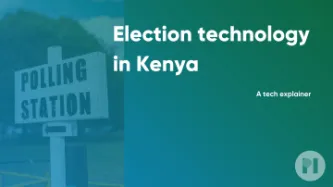Search
Content type: Long Read
A tribunal in the UK has overturned a legal judgment about Clearview’s objectionable scraping of images of people’s faces from the internet. The latest ruling helpfully clarifies what should be in scope of data protection law, and provides a sensible view on how companies that operate across many jurisdictions should not be able to dodge the application of local laws.Clearview’s model of selling intrusive surveillance to law enforcement agencies is not just grim, it also undermines people’s…
Content type: News & Analysis
Last week marked the 20th anniversary of the Declaration of Principles (DoP) for International Election Observation. Over 50 endorsing election observation organisations representing all regions of the world met at the United Nations to reaffirm their commitment to supporting genuine democratic elections and to the principles for international election observation as set forth in the Declaration.Reflecting on the increasing role played by personal data and data-intensive technologies in the…
Content type: Long Read
Following the publication of our Technology, Data and Elections Checklist, we have created a deck of Tech, Data and Elections Playing Cards. Both the checklist and the deck of cards aim to give electoral observers and civil society the necessary tools to understand and question the role of technologies in the electoral process. The cards enable a playful way to explore with important topics such as:♥ Hearts: Why does data protection matter during the election cycle?♦ Diamonds: What tech is…
Content type: Long Read
In England’s schools, children are not only pupils but also data subjects. From the moment they are born, a digital record begins to take shape — one that will follow them through nursery, primary school, secondary education, and in many cases well into adulthood.What was once a matter of paper registers and filing cabinets has become a complex infrastructure of digital systems, databases, and analytics tools, managed by both the state and private companies, for AI, surveillance, and more.…
Content type: News & Analysis
Today we learned the UK has issued a new secret order forcing Apple to undermine iCloud’s advanced encryption again, but this time only for UK users.While this seems like progress - and it is in the sense that the UK is clearly reacting to the global concern and US Government pressure generated by its original directive to Apple - the new order may be just as big a threat to worldwide security and privacy as the old one. The status of the original order remains unclear.If true, this new order…
Content type: Long Read
In their gold rush to build cloud and AI tools, Big Tech is also enabling unprecedented government surveillance. Thanks to reporting from The Guardian, +972 Magazine, Local Call, and The Intercept, we have insights into the murky deals between the Israeli Government and Big Tech firms. Designed to insulate governments from scrutiny and accountability, these deals bode a dark future for humanity, one that is built using the same tools that once promised a bright, positive world.On 25 September…
Content type: Long Read
Across the world facial recognition technologies (FRT) are increasingly being deployed in public and private spaces without adequate laws or regulation to protect individuals from the grave risks they pose to human rights. States rely more and more on this technology for public mass surveillance, enabling an authoritarian omnipresence over people’s activities, movements, and expressions at all times, often without them knowing.Over the past few years we have raised concerns about the rapid…
Content type: Video
Links Maria's original rewilding article, with Robin Berjon, in Noema Maria's article 'This is your phone on feminism'A talk Maria gave about rewildingMaria's website where you can keep an eye to find out when her book is coming out!London Centric and the F**k you busMore about PI's work on competition
Content type: News & Analysis
Freedom of Information (FOI) requests have revealed the rapidly increasing scale of police mass facial recognition searches against the passport and immigration databases. New figures reveal that the number of searches of the passport database has “skyrocketed” from 2 in 2020 to 417 in 2023, and an almost sevenfold increase from 16 searches of the immigration database in 2023, to 102 in 2024. The Home Office and police forces are conducting these searches against over 150 million photos of the…
Content type: News & Analysis
We’ve been warning for a while now about the risks of AI Assistants. Are these assistants designed for us or to exploit us?The answer to that question hinges on whether the firms building these tools are considering security and privacy from the outset. The initial launches over the last couple of years were not promising.Now with OpenAI’s agent launch, users deserve to know whether these firms are considering these risks and designing their service for people in the real world. The OpenAI…
Content type: Long Read
Period tracking apps and the rollback of reproductive rightsThe aftermath of the overturning of Roe v. Wade in the United States (US) sparked widespread debate and concern that data from period tracking apps could be use to criminalise those seeking abortion care.While the surveillance and criminalisation of reproductive choices are neither new nor unique to the US, the scale and intensity of today’s crisis continue to grow. To put it into perspective, 22 million women and girls of reproductive…
Content type: Long Read
The security of our devices, applications and infrastructure is paramount to the safe functioning of our digital lives. Good security enables trust in our systems, it is fundamental to protecting the critical information we store and exchange through networks and devices. Similar to how we physically secure our homes, offices and schools, securing devices and software allows us to operate in safe and trusted environments where our security is guaranteed and protected.Security for information…
Content type: News & Analysis
We’ve been asked a lot lately about whether it is safe to travel, particularly to the US. And it’s not surprising why: the US Government is increasing their cruelty at borders.Border management today is fueled by our data, but government officials want more. They want as much data as they can get to catch you out. They’ve reportedly detained or deported people based on their free speech activities, denying entry on tenuous grounds like having the wrong photos on phones (including in in the ‘…
Content type: Long Read
It’s important to us at PI that we continue to create real change in the world. We want our work to matter, and we challenge ourselves continuously to verify that it does.In 2024 we made substantial progress towards concrete systemic change. We challenged governments and corporations that exploit data and technology, pushed for new national and international policy standards, drove standard-setting action by courts and regulators. We educated and campaigned with others.As a result, we produced…
Content type: Explainer
Imagine this: a power that secretly orders someone anywhere in the world to abide and the receiver can’t tell anyone, can’t even publicly say if they disagree, and can’t really question the power in open court because the secret order is, well, secret. Oh and that power affects billions of people’s security and their data. And despite being affected, we too can’t question the secret order.In this piece we will outline what’s ridiculous, the absurd, and the downright disturbing about what’s…
Content type: Long Read
Intrusive surveillance technology is increasingly used during protests around the world, and we’ve been tracking its use around the world for years.This technology is often being deployed in secret, without a clear legal basis and without the safeguards and oversight applied to other surveillance technologies under international human rights law.We’ve increasingly observed the use of unlawfully generated and collected data from these technologies being used in court against people exercising…
Content type: Long Read
Increasingly, EdTech systems are less about teaching than about monitoring, security and ‘safety’ – although those aims are often mixed with wider educational claims.For instance, one company offering “high quality surveillance systems and CCTV for schools including sophisticated infra-red cameras which record in the darkest areas” claimed that these both deter “bad or antisocial behaviour from pupils, parents and visitors” and improve the concentration, productivity and attainment of the…
Content type: News & Analysis
We’ve published a new tech explainer on election technologies in Kenya. The explainer takes a deep dive into the technologies employed to manage and administer the election process in Kenya, such as biometric voter registration (BVR), voter identification, results transmission, and candidate management systems.Electoral processes - along with elections themselves - are one of the largest government data-gathering exercises undertaken, making them susceptible to data exploitation and privacy…
Content type: Long Read
Social media is now undeniably a significant part of many of our lives, in the UK and around the world. We use it to connect with others and share information in public and private ways. Governments and companies have, of course, taken note and built fortunes or extended their power by exploiting the digital information we generate. But should the power to use the information we share online be unlimited, especially for governments who increasingly use that information to make material…
Content type: Long Read
Sports are a huge part of daily life for billions around the world, a fundamental aspect of the rich tapestry of the human experience.Attending a major sporting event can be a formative experience in someone’s life, as a place to share in a communal culture.Increasingly we have seen surveillance, and especially mass surveillance measures, being introduced at sports events impeding the enjoyment particularly of the right to privacy and right to participate in sporting life.When we saw that the…
Content type: News & Analysis
On 15 May 2024, a London Administrative Court handed down its judgment in the case of ADL & Ors v Secretary of State for the Home Department, just two months after another court judgment and a ruling of the UK's data protection authority (ICO). The four Claimants in this latest case (including asylum seekers and survivors of trafficking) were challenging the UK Home Office's policy of placing people released from immigration detention under 24/7 GPS surveillance - either by shackling them…
Content type: Long Read
IntroductionFor years PI has been exposing and advocating against the use of facial recognition technology (FRT) and the grave threats it poses to our rights. This highly invasive technology is paving the way to a dystopian, biometric surveillance state, where everyone is identified and tracked everywhere they go, in real time, as they move through public spaces during their everyday lives. Furthermore, this is taking place within a democratic vacuum, without any specific legislation pertaining…
Content type: Long Read
TAKE ACTION TO STOP THE END OF PRIVACY IN PUBLIC1. IntroductionThe use of facial recognition technology (FRT) by law enforcement and private companies in public spaces throughout the UK is on the rise. In August 2023, the government announced that it is looking to expand its use of FRT, which it considers “an increasingly important capability for law enforcement and the Home Office”. The indiscriminate use of this dystopian biometric technology to identify individuals in public spaces is a form…
Content type: Long Read
In 2022, Privacy International continued to produce real change by challenging governments and corporations that use data and technology to exploit us. And, we produced substantial impact that directly affects each of us.
Here are a handful of our biggest achievements in 2022.
WE CHALLENGED COMPANIES TO CHANGE THEIR BUSINESS MODELS AND PRACTICES
Regulators in UK, France, Greece, and Italy fined and restricted Clearview AI’s activity
Clearview AI built a massive database of our biometrics, by…
Content type: News & Analysis
Our mobile phones contain all kinds of data that ranges from photos, videos and emails to information about our health, the places we visit and our leisure time. This data is often relied upon by law enforcement authorities in criminal investigations.
Mobile phone extraction (MPE) tools are used for this purpose as they enable police and other authorities to download content and associated data from people’s phones. These tools are supplied by private companies to security forces and…
Content type: Long Read
On 18th January, it was announced that end-to-end encrypted iCloud services, Advanced Data Protection, would be offered to Apple users globally.The offer of such level of security globally, while overdue, is a key step to ensuring trust and confidence in today’s world. There are too many threats to our data and our rights. Twelve years ago, we called on Apple to encrypt iCloud storage for users all around the world.Why this is importantWhile privacy and security is often portrayed as opposite…
Content type: News & Analysis
We have been fighting for transparency and stronger regulation of the use of IMSI catchers by law enforcement in the UK since 2016. The UK police forces have been very secretive about the use of IMSI catchers – maintaining a strict “neither confirm nor deny” (NCND) policy. In our efforts to seek greater clarity we wrote to the UK body which monitors the use of covert investigatory powers, the Investigatory Powers Commissioner’s Office (IPCO), asking the Commissioner to revisit this…
Content type: Long Read
The UK’s security services have the power to collect, analyse, and store huge amounts of personal data. They can target specific individuals, hack their computers, and intercept their data or communications, but they can also obtain personal datasets in bulk, intercept overseas communications in bulk, and collect huge swathes of communications data from telecomms providers.[1]
The public rightly expects that the vast amounts of personal data which agencies like MI5 collect and store will be…
Content type: News & Analysis
In a judgment of 14 October 2022, the UK High Court ordered the UK Home Office to provide remedy to the thousands of migrants affected by its unlawful policy and practice of seizing mobile phones from people arriving by small boats to UK shores.
The availability and spread of new technologies, and the exponential amounts of data they generate, are regularly being abused by governments to surveil and control people - but these new forms of surveillance are only starting to make their way through…
Content type: News & Analysis
Privacy International (PI) has today filed complaints with the Information Commissioner (ICO) and Forensic Science Regulator (FSR) against the UK Home Office's use of GPS ankle tags to monitor migrants released on immigration bail. This policy and practice represents a seismic change in the surveillance of migrants in the UK. PI was first alerted to this scheme by organisations such as Bail for Immigration Detainees, an independent charity that exists to challenge immigration detention in the…




























